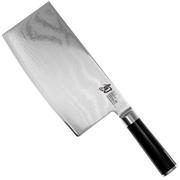

You have an outdated webbrowser. The website might not work correctly.
You buy a kitchen knife for a specific purpose of course, but there's no reason why it shouldn't look great too. A knife should be functional and have an appealing appearance. With a Chinese chef's knife this is exactly what you get: the rectangular blade is both effective and aesthetically pleasing.
You can recognize the Chinese chef's knife by its rectangular blade. The blade is approximately 18 to 20 cm long and 10 cm high. But don't be mistaken, these aren't cleavers! While the blade of a cleaver is robust, the blade of a Chinese chef's knife is wafer-thin and razor-sharp. As such it cannot be used to chop through bones.
In the Chinese kitchen this chef's knife is often used because the height of the blade enables you to easily use your fingers as a guide as you're cutting your ingredients. It works safely and quickly and is very practical. You use a Chinese chef's knife to finely cut herbs and vegetables, but a Chinese chef's knife can also be used to crush garlic. With the high blade you can easily scoop the sliced vegetables or herbs into the pan.
With a Chinese chef's knife, you use a cutting technique that is different from the technique used for European chef's knives. The Chinese chef's knife doesn't 'rock' back and forth on the surface but moves diagonally from back-top to front-down. The knife constantly remains in a horizontal position.
Maintaining your kitchen knives is always a good plan: clean it them by hand after each use, oil the knives regularly and, above all, use a wooden or plastic cutting board. You can damage the knife by cutting on a hard surface, so it is better to grab a cutting board made of a softer material like wood. Regularly oiling the blade prevents rust from forming. And by cleaning the knife thoroughly after each use you will keep the knife free of any food residue, which prevents corrosion or staining. Use a mild detergent and a soft sponge when cleaning. The knife should be completely dry before you store it. Make sure to dry it well too, to prevent rust from forming.
Extend the lifespan of your Chinese chef's knife by sharpening it regularly. How often you need to sharpen the knife depends on how often you use it. Do you use it sporadically or on a daily basis? As a general piece of advice, recommend sharpening once every 3 to 6 months. Of course, the sharpness of your blade is the main indication on when to sharpen it. Is it getting harder to remove tendons or cut vegetables with a tough skin? Then the knife is probably in need of a sharpening.